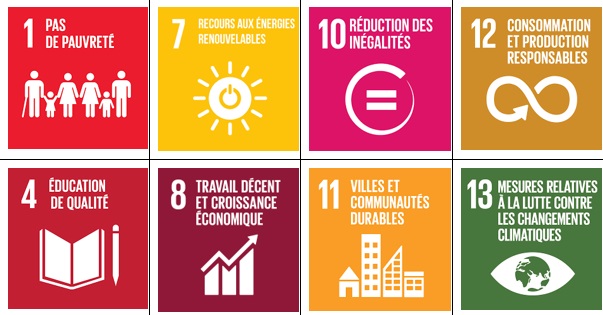In 2020-21, LAGAZEL has conducted a project aiming at strengthening and developing the local added value of LAGAZEL’s production workshops in order to offer quality solar products to the off-grid solar industry while creating sustainable local jobs in Burkina Faso et in Benin. With the financial support of the Powering Renewable Energy Opportunities (PREO) Programme, supported by UK aid via the Transforming Energy Access platform, a study was conducted by the research association IFSRA in order to evaluate how the presence of the said factories in these localities can contribute to the improvement of the living environment of the populations through the creation of jobs and local added value. You will find below a summary sheet of the study, the executive summary and cases studies collected among three project’s stakeholders.
- The project and its context
LAGAZEL is the first company to industrialise the manufacture of quality solar lamps and kits on the African continent in order to provide a local solution for families without access to electricity. Its objective is to manufacture green products locally in African workshops, in order to contribute to the industrial and economic development of the continent. Lagazel currently has 2 West African workshops in Burkina Faso and Benin and plans to create 5 workshops within 5 years.
The Powering Renewable Energy Opportunities (PREO) Programme aims to demonstrate how the off-grid energy sector can stimulate local job creation, gross value added (R&D, testing, manufacturing, assembly and end-use, repair, refurbishment, recycling) and improved quality of life in sub-Saharan Africa.
The project proposed by LAGAZEL is part of this global framework and aims to strengthen and develop the local added value of LAGAZEL’s production workshops in order to offer quality solar products to the off-grid solar industry while creating sustainable local jobs. The project has 3 main axes:
- Develop the local added value of the LAGAZEL product range (lamps, solar kits)
- To start the production of components and sub-parts of solar products, especially as subcontractors for other actors in the sector
- Initiate local R&D for the development of new low-tech products with the aim of local manufacturing.
- Issues and methodology
The main objective of the study was to investigate the socio-economic impact of LAGAZEL’s activity on the defined areas, and with the following groups: LAGAZEL employees, solar product retailers (LAGAZEL or not), administrative officials, economic and political actors and the local population.
The main objectives were to:
- assess the viability of local production ;
- assess the impact on employability
- assess the direct and indirect economic and social impact of the project on the local population and the local community.
The main question that arises in the case of the LAGAZEL lamp and solar kit manufacturing company located in Burkina Faso (Dédougou) and Benin (Porto-Novo) is how the presence of the said factories in these localities can contribute to the improvement of the living environment of the populations through the creation of jobs and local added value.
To address this issue and prior to the start of the data collection phase in the field, IFSRA carried out a sampling and tool creation exercise and shared it regularly with the LAGAZEL monitoring team in order to validate the method and tools.
- Impact analysis
The evaluation highlighted the major impacts of the presence of the factories at the local level as being:
-
- The creation of quality formal jobs that meet the criteria of the employees with an effort to include vulnerable people;
- The creation of training opportunities at the local level in order to link the training entities active at the local level resulting in the contribution to the national effort of production of qualified manpower in the solar sector;
- The improvement of the living conditions of the local populations, both for the employees who evolve in a favourable and equitable working environment, and for the retailers and users of the products, with notably positive effects on health by the replacement of highly polluting and harmful traditional products and on education;
- The supply of sustainable products and quality and proximity services, involving the presence of a reactive and efficient after-sales service, an R&D department allowing the efficient evolution of products to adapt them to the needs and problems making the products even more sustainable and adapted;
- A local presence facilitating the rapid satisfaction of needs through the availability of stocks at local level and the reduction of taxes and transport costs;
- The contribution to the influence of the commune on its national territory but also internationally, particularly appreciated by local consumers who are proud to consume local products and which fits perfectly into the African trend of promoting “Made in Africa”.
- The contribution to the protection of the environment by replacing traditional oil or battery lamps, which leads to a reduction in CO2 emissions, a reduction in exposure to harmful fumes and the risk of fire, and a reduction in waste (plastics, batteries) due to the durability of the products.
- Case studies
Three case studies were conducted in order to evaluate in a qualitative way the effects of the implantation of Lagazel facilities on local stakeholders (Only available in French).
- Contribution to the Sustainable Development Goals (SDG)
Taking into account the impacts described above, we can conclude that LAGAZEL’s production model based on the presence of factories at local level contributes to 8 out of the 17 sustainable development goals presented below.
- Challenges
Despite all these positive impacts, LAGAZEL is still forced to face challenges such as the strong competition they face and in particular, at the local level, due to the presence of many poor quality but very cheap products; the lack of consideration of the specificities of the local manufacturing model by international quality certification standards. Similarly, the current security climate, particularly in Burkina Faso, cannot be ruled out either. The deteriorating security conditions in the country and, more recently, in the Boucle du Mouhoun region constitute a real challenge for the company to continue to operate normally.
- Recommendations
From the analysis, certain recommendations arise. Thus, it seems necessary, given the LAGAZEL model, to strengthen communication on the quality of the products by relying on its strong points that are particularly appreciated in the local context, namely: solidity and durability. It would also be advisable to strengthen advocacy actions, on the one hand, for the integration of the place of production in the international certification criteria of off-grid solar products, based on all the impacts identified in this report and, on the other hand, to take advantage of the favourable “made in Africa” context and to strengthen advocacy with the States in this sense to increase the advantages, particularly fiscal, for the benefit of the company and the African factories. And finally, local partnerships with institutions, authorities and training centres should be strengthened in order to formalise them, which would further support the local anchoring of the company.


